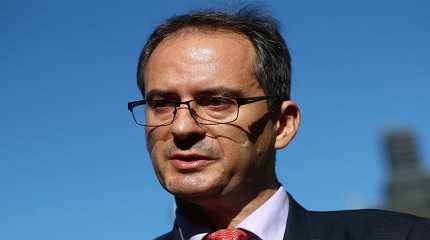
SOFIA, Dec 29 (Reuters) - Bulgaria protested to Russia on Thursday for putting Bulgarian investigative journalist Christo Grozev on a wanted list, with its prime minister criticising the move as an intimidatory tactic designed to muzzle free speech.
Grozev, chief investigator on Russia for the Bellingcat news outlet, is "wanted under an article of the Criminal Code," according to information published on Russia's interior ministry website this week.
Interim PM Galab Donev said Bulgaria would demand full information from Russia on why Grozev had been put on the list.
"This act is unacceptable. It represents an attack on freedom of speech and an attempt to intimidate a Bulgarian citizen," Donev told reporters.
The foreign ministry summoned Russia's ambassador to Sofia, Eleonora Mitrofanova, to deliver the protest.
Grozev has angered Moscow with investigations into the poisoning of Kremlin critic Alexei Navalny, the poisoning of former Russian double agent Sergei Skripal and the downing of the MH17 passenger plane over eastern Ukraine.
Russia has denied responsibility for any of those attacks.
Grozev, who keeps his whereabouts hidden for security reasons, said adding him to the wanted list might be a move to prevent other journalists from looking into what is happening in Russia.
"For years they've made it clear they are scared of our work and would stop at nothing to make it go away," he said in a tweet.
His recent reports have been on Russia's invasion of Ukraine.
Grozev "focuses on security threats, extra-territorial clandestine operations, and the weaponisation of information" according to Bellingcat's website.
Speaking to Bulgarian NOVA TV channel from an unknown location on Wednesday, Grozev said was afraid for his life and that someone on their own initiative may want to do "a favour to the Kremlin" and attempt to eliminate or abduct him.
Ambassador Mitrofanova said Bulgaria should ask Russia's interior ministry why Grozev was put on the list adding that, while he was no longer welcome in Russia, it "does not mean that someone will search for him around the world."
Grozev said he has been offered help by the Netherlands, Sweden, Estonia and Austria, where he has been living in recent years.
The office of Bulgaria's president has said Sofia was also taking steps to ensure his security.




